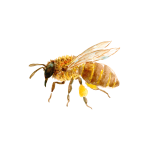Ecological beekeeping on the rooftops of Kreuzberg’s Berlin city beekeeper

The cycle of life of the bees in Berlin
We run our hobby beekeeping on a Kreuzberg roof garden. Outside of pesticide-polluted agricultural areas, in a big city which, like hardly any other in Europe, offers extensive parks, miles of green ribbons along the railway lines, the Spree and the waterway, tree-lined avenues and, last but not least, large areas with allotment garden colonies, our bees find a variety of flowering costumes from the beginning to the end of the vegetation period. After the hibernation willows and poplars, later in spring the red and white chestnuts with the spring flowers of the allotment gardens and the yellow blossoming mahonias of the tree slices of the avenues form a varied food basis and with the resin of the poplar buds the basis for the putty resin of the bees, propolis. The first honey is harvested at the end of May with the early start of spring in the big city. After the sweet-scented robinia has faded, the second honey is centrifuged in June. After the lime blossom in August, the sea buckthorn blossom and the goldenrod on the railway embankments, the third spin follows in September with the infinite variety of late summer blossoms in the allotment gardens and parks. Our bees fly out until mid-November, when the city’s abundance of flowers runs dry. This last honey and the pollen we leave to our bees as part of the winter food. In winter we make new central walls from the wax supplied by the solar melter from honeycombs that are no longer used.
Basics of working with our bees
- No use of chemical additives
- Genetic diversity: Our queens mate with wild drones (male bees) in Kreuzberg. This results in resistant mixed colonies.
- In autumn the bees are fed several times with the winter food an infusion of wild herbs from the surroundings.
- Use of own beeswax from the solar smelter for new central walls (basis of honeycomb construction).
- Our honey is hand centrifuged and filled by hand.
- Location loyalty: We do not drive kilometres to the traditional costumes in an energy-intensive manner and disturb the cohesion and orientation of the peoples. The bees collect the nectar of the surrounding flowers from chestnuts, lime trees, robinias and the variety of flowers in the parks and allotments.
- We use organic formic acid to regulate the varroa mite (bee parasite).

Healing
Apitherapy is the use of bee products for medicinal purposes called regional honey acts as an allergy prophylaxis, as it contains the pollen of the flowers that are around us daily. In addition to strengthening the immune system, we have also had very good experience with freshly extracted honey for wound treatment. We also use propolis tincture, bee venom and beeswax for healing purposes. Propolis is the putty resin which the bees produce for sealing their buildings and for disinfection.
Beekeeping community
As members of the Neukölner Imkerverein we were invited to a discussion with the Federal Minister for Environmental Protection and Consumer Protection in Southern Germany after the death of bees in 2008. The pesticide Clothianidin produced by Bayer was clearly responsible for the bee mortality.
Foundation of the Kreuzberg Beekeepers’ Association
The beginnings of the Kreuzberger Imkerverein have their roots in the HeileHaus. Since 2012 regular meetings of Kreuzberg beekeepers have taken place here. From this the Kreuzberger beekeepers’ association was founded in 2014.
imkerverein-kreuzberg.de
